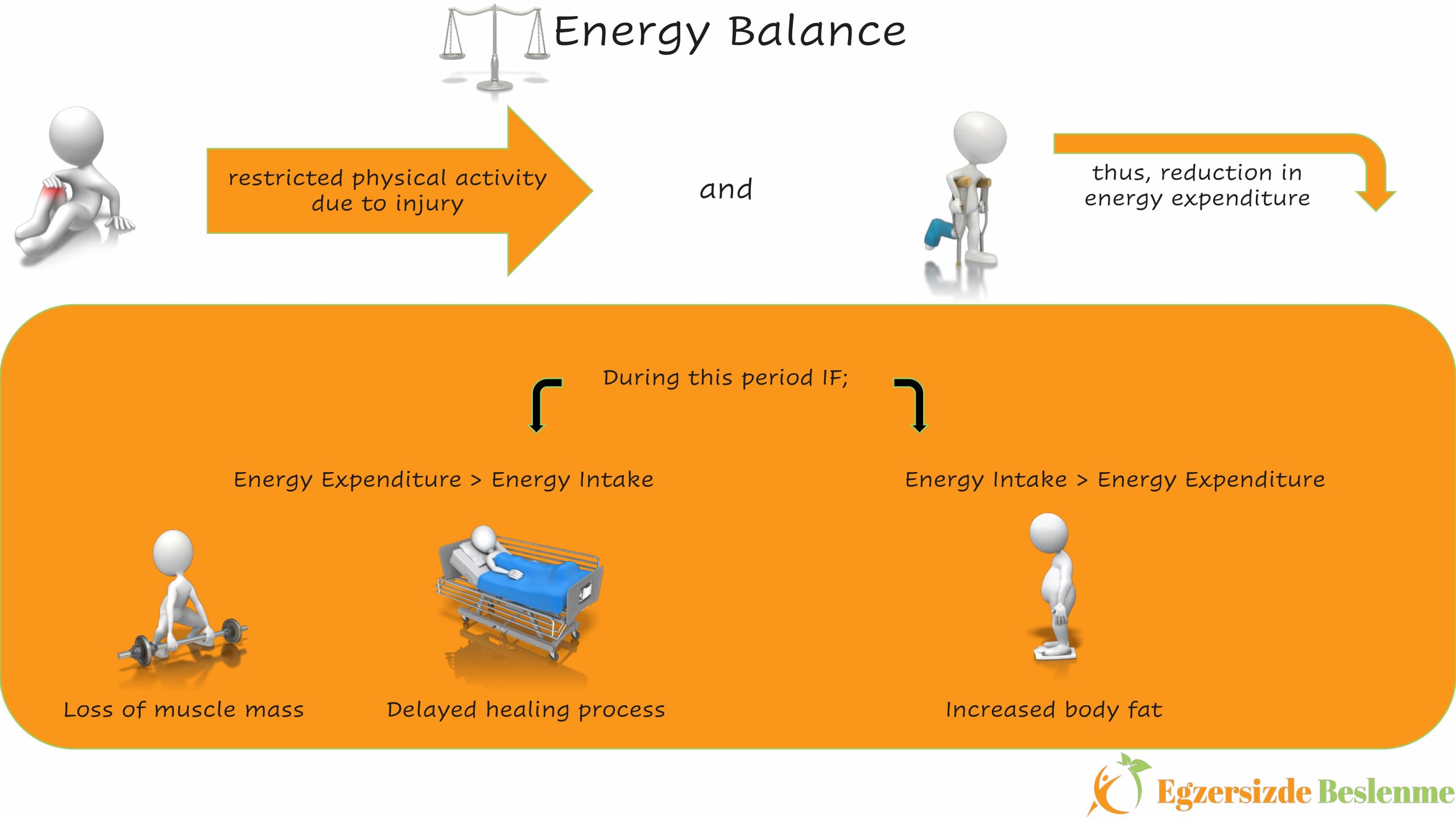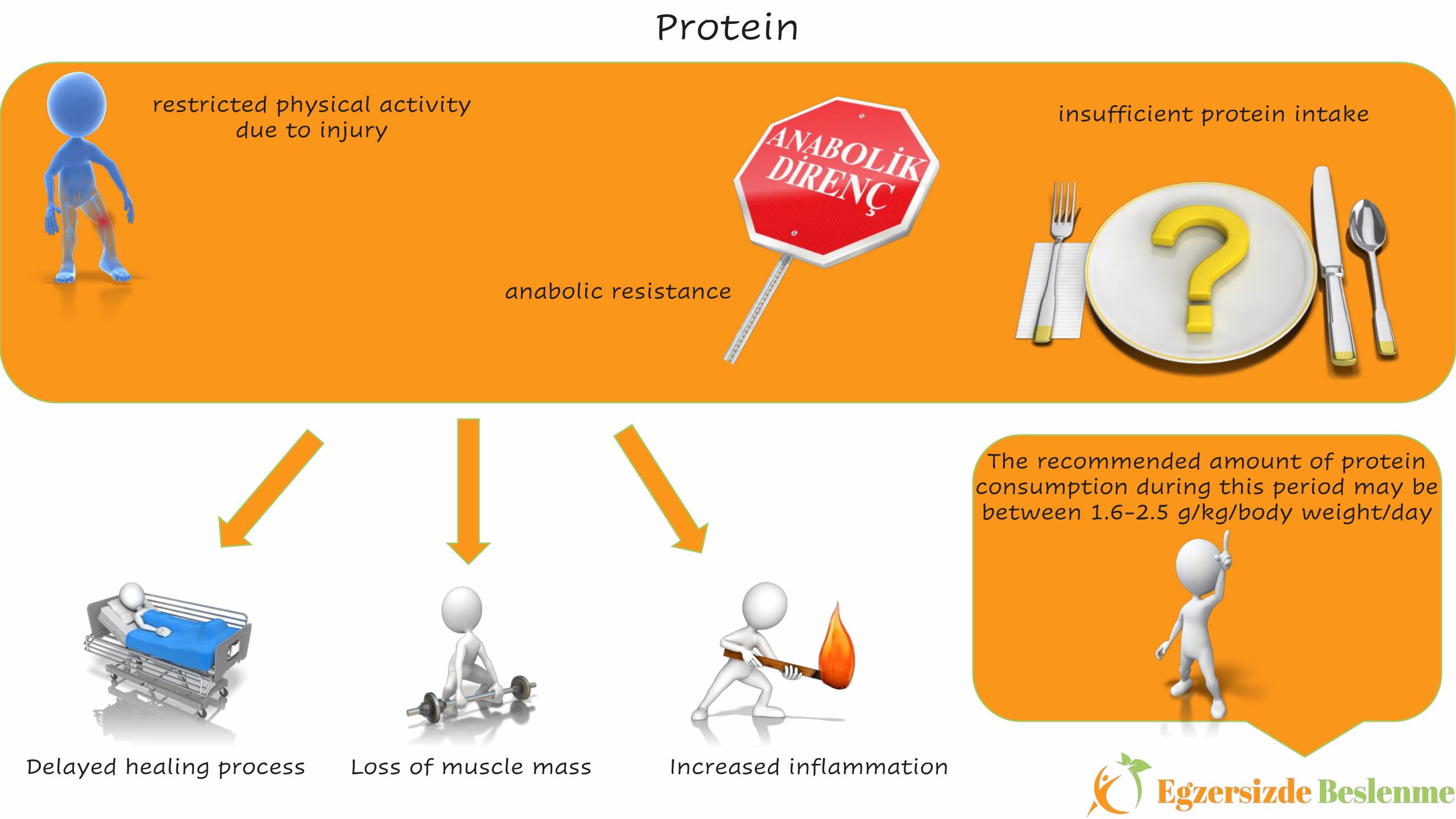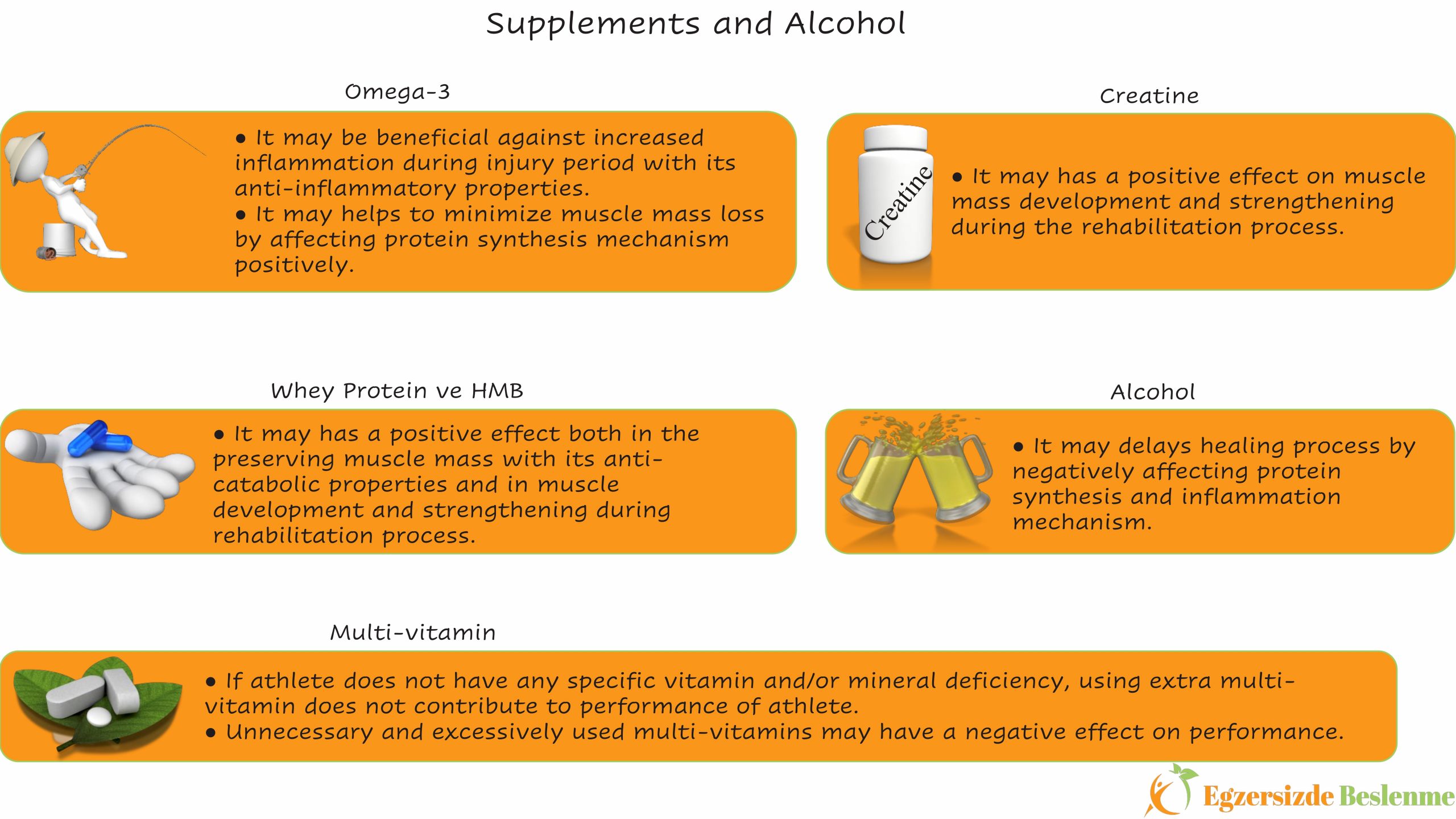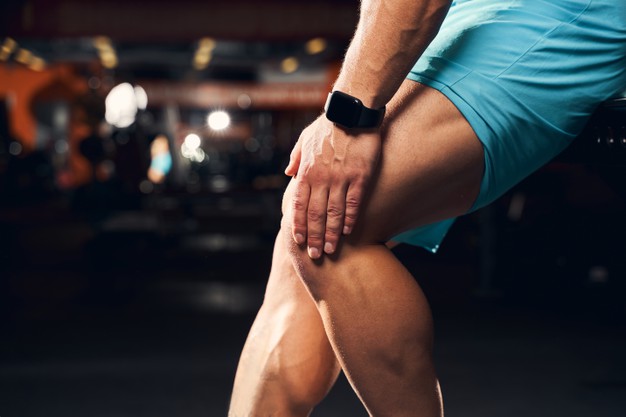Nutritional Principles in Sports Injuries
Injuries during exercise or competition are one of an athlete’s worst nightmares. Although the most ideal scenario and desired situation by the health professionals is that the injury has never happened, it is a multi-disciplinary process that should be carried out very carefully to ensure that the injured athlete returns to the training program and most importantly to the competitions as soon as possible. However, nutrition may be overlooked by injured athletes. I have compiled the nutritional recommendations that can help you get through this difficult process with little harm and as soon as possible, under the guidance of scientific articles.
- The most important risk factors to be considered for athletes going through an injury period are increase in adipose tissue, breakdown in muscle tissue and the resulting loss of performance.
- The daily energy expenditure of the athletes who have gone through the injury period should be calculated carefully and a nutrition program specific to the athlete should be prepared by considering these values and the goals and habits of the athlete.
- In order to minimize the “anabolic resistance” and related muscle loss that may occur due to the compulsory restriction of physical movement during the injury period, more protein-rich foods should be included in the nutrition programs.
- Nutritional supplements such as omega-3, creatine, and HMB (beta-hydroxy beta-methyl butyrate) have potential benefits for athletes going through a period of injury, but the use of these nutritional supplements should be individualised and should therefore be used under the supervision of expert personnel. Consumption of alcohol-containing products should be minimized during this period, as alcohol affects the recovery process of athletes going through a period of injury negatively and prolongs the process.

Energy Balance
Duration and the intensity of daily living activities and training of an athlete going through an injury decreases inevitably. The rate of reduction in energy expenditure varies according to the injured extremity and the severity of the injury (such as a lower extremity disability that interferes with walking). If energy intake is restricted more than necessary, this negative energy balance causes a slowdown in the recovery process and an increase in muscle loss(1). On the contrary, if the energy intake is not restricted and the energy intake in the pre-injury period is continued, an increase in the amount of body adipose tissue is observed. The protocol to be implemented in this period is to carefully calculate the energy expenditure of the athlete and to prepare a nutrition program suitable for this value.

Protein
Physical activity, which is reduced or completely abandoned during the injury period, causes the athlete to lose muscle(2,3). Scientific studies reveal that this period without physical activity has a negative effect on the protein synthesis mechanism of the body and that protein synthesis decreases despite the same amount of protein consumed (anabolic resistance)(4). In addition, insufficient protein intake causes prolongation of the recovery process and increased inflammation(5). In order to maintain the ideal recovery process of the athletes during the injury period, the required protein intake should be between 1.6-2.5 g/kg body weight/day (for example, the daily protein intake for a 70 kg athlete should be between 112-175 g)(6).

Nutritional Supplements and Alcohol
It would be disappointing not to mention nutritional supplements when writing about a topic that concerns injured athletes. In this section, under the guidance of scientific articles, I gave information about nutritional support products that may have potential benefits for athletes going through an injury period, and alcohol, which may negatively affect athletes during this period.
Omega-3
Omega-3 is found in high levels in cold sea fish (salmon, sardines, mackerel), nuts (walnuts) and seeds (flaxseed, chia seeds). Factors affecting access to these foods (geography, economy, etc.) and/or people’s taste (such as not liking fish because of its taste and/or smell) lead individuals to omega-3 nutritional supplements. Omega-3, its anti-inflammatory properties, can be useful during periods of intense and/or prolonged inflammation in the body. However, inflammation is a necessary phase for wound recovery and inflammation should not be suppressed more than necessary during this period. Scientific studies have shown that the uncontrolled use of omega-3 nutritional supplements negatively affects the wound recovery process (7). In addition to its anti-inflammatory properties, omega-3 increases the body’s ability to use protein and, accordingly, protein synthesis (reduces muscle loss) by having a positive effect on the “anabolic resistance” mechanism we mentioned in the protein title (8,9). However, instead of the uncontrolled and rote use of omega-3, it would be the most prudent approach to include more natural omega-3 sources in the athlete’s diet.
Creatine
Creatine is an amino acid component that can be synthesized naturally in the body. It is abundant in red meat and seafood and is frequently used by athletes competing in sports that require high-intensity training (sprint, weight, etc.) and a lot of effort in a short time (100 m running, rowing races, team sports such as rugby, football, etc.). Creatine is used in the rehabilitation process, where physical movement is initiated gradually, to help the athlete develop and strengthen muscles (10).
Whey Protein (Enriched with Leucine) and HMB (beta-hydroxy beta-methyl butyrate)
Whey protein enriched with leucine content is used by athletes going through a period of injury due to its anti-catabolic property and ability to stimulate protein synthesis at a higher rate than other amino acids (11). HMB, an active metabolite of leucine, also attracts the attention of athletes going through this period due to its anti-catabolic property (12). Although these two products, like creatine, can be used to increase muscle mass and strength during the rehabilitation period, where physical activity is started gradually, they are also used to preserve muscle mass during the period of limited movement.
Multi-vitamins
Micronutrients such as vitamin D, vitamin C, calcium, and zinc have potential benefits for athletes going through injury. However, scientific studies have shown that if the athlete does not have any micronutrient deficiency, using extra multi-vitamin supplements will not provide any benefits to the athlete in terms of both recovery and performance (5). On the contrary, using uncontrolled high doses of multi-vitamin supplements has a negative effect on both recovery and performance (13,14). It will be the most prudent approach to increase the amount of foods rich in micronutrients (milk and dairy products, legumes, vegetables and fruits) in the nutrition program of the athlete and to use supplements to treat this deficiency if the athlete has a specific deficiency of any micronutrient.
Alcohol
In addition to nutritional supplements, another issue that needs to be mentioned for athletes going through an injury period is alcohol use. Alcohol negatively affects protein synthesis and inflammation-fighting mechanism, causing both increased muscle loss and prolongation of recovery (15, 16, 17). For this reason, athletes going through the injury period should limit their alcohol consumption as much as possible.
I tried to briefly explain how important nutrition, which is often ignored, can be for athletes going through a period of injury and nutritional support products that may have potential benefits during this period. I hope you will not have to read these lines except to improve your general culture throughout your sports life.
References
- Biolo, G., Ciocchi, B., Stulle, M., Bosutti, A., Barazzoni, R., Zanetti, M., Antonione, R., Lebenstedt, M., Platen, P., Heer, M., and Guarnieri, G. (2007) Calorie restriction accelerates the catabolism of lean body mass during 2 wk of bed rest. J. Clin. Nutr. 86, 366-372.
- Wall, B.T., Dirks, M.L., Snijders, T., Senden, J.M.G., Dolmans, J., van Loon, L.J.C. (2014) Substantial skeletal muscle loss occurs during only 5 days of disuse. Acta Physiol. 210, 600-611.
- Tipton, K.D., Borsheim, E., Wolf, S.E., Sanford, A.P., Wolfe, R.R. (2003) Acute response of net muscle protein balance reflects 24-h balance after exercise and amino acid ingestion. J. Physiol. 284, 76-89.
- Breen, L., Stokes, K.A., Churchward-Venne, T.A., Moore, D.R., Baker, S.K., Smith, K., Atherton, P.J., Phillips, S.M. (2013) Two weeks of reduced activity decreases leg lean mass and induces anabolic resistance of myofibrillar protein synthesis in healthy elderly. Clin. Endocrinol Metab. 98(6), 2604-12.
- Tipton, K.D. (2015) Nutritional support for exercise-induced injuries. Sports Med. 45, 93-104.
- Wall, B.T., Morton, J.P., van Loon, L.J.C. (2015) Strategies to maintain skeletal muscle mass in the injured athlete: Nutritional considerations and exercise mimetics. J. Sport Sci. 15(1), 53-62.
- Albina, J.E., Gladden, P., Walsh, W.R. (1993) Detrimental effects of an omega-3 fatty acid-enriched diet on wound healing. J Parenter. Enteral Nutr. 17, 519-521.
- Smith, G.I., Atherton, P., Reeds, D.N., Mohammed, S.B., Rankin, D., Rennie, M.J., Mittendorfer, B. (2011) Dietary omega-3 fatty acid supplementation increases the rate of muscle protein synthesis in older adults: A randomized controlled trail. J. Clin. Nutr. 93(2), 402-412.
- Smith, G.I., Atherton, P., Reeds, D.N., Mohammed, B.S., Rankin, D., Rennie, M.J., Mittendorfer, B. (2011) Omega-3 polyunsaturated fatty acids augment the muscle protein anabolic response to hyperaminoacidemia-hyperinsulinemia in healthy young and middle-aged men and women. Sci. 121(6), 267-278.
- Hespel, P., Op’t Eijnde, B., van Leemputte, M., Urso, B., Greenhaff, P.L., Labarque, V., Dymarkowski, S., van Hecke, P., Richter, E.A. (2001) Oral creatine supplementation facilitates the rehabilitation of disuse atrophy and alters the expression of muscle myogenic factors in humans. Physiol. 536(2), 625-633.
- Tang, J.E., Moore, D.R., Kujbida, G.W., Tarnopolsky, M.A., Phillips, S.M. (2009) Ingestion of whey hydrolysate, casein, or soy protein isolate: Effects on mixed muscle protein synthesis at rest and following resistance exercise in young men. Appl. Physiol. 107, 987-992.
- Deutz, N.E.P., Pereira, S.L., Hays, N.P., Oliver, J.S., Edens, N.K., Evans, C.M., Wolfe, R.R. (2013) Effect of b-hydroxy-b-methylbutyrate (HMB) on lean body mass during 10 days of bed rest in older adults. Nutr. 32, 704-712.
- Ristow, M., Zarse, K., Oberbach, A., Klöting, N., Birringer, M., Kiehntopf, M., Stumvoll, M., Kahn, C.R., Blüher, M. (2009) Antioxidants prevent health-promoting effects of physical exercise in humans. 106(21), 8665-8670.
- Cobley, J.N., McHardy, H., Morton, J.P., Nikolaidis, M.G., Close, G.L. (2015) Influence of vitamin C and vitamin E on redox signaling: Implications for exercise adaptations. Free Radic. Biol. Med. 84, 65-76.
- Parr, E.B., Camera, D.M., Areta, J.L., Burke, L.M., Phillips, S.M., Hawley, J.A., Coffey, V.G. (2014) Alcohol ingestion impairs maximal post-exercise rates of myofibrillar protein synthesis following a single bout of concurrent training. PLoS ONE. 9(2), e88384.
- Jung, M.K., Callaci, J.J., Lauing, K.L., Otis, J.S., Radek, K.A., Jones, M.K., Kovacs, E.J. (2011) Alcohol exposure and mechanism of tissue injury and repair. Clin. Exp. Res. 35(3), 392-399.
- Vargas, R., Lang, C.H. (2007) Alcohol accelerates loss of muscle and impairs recovery of muscle mass resulting from disuse atrophy. Clin, Exp. Res. 32(1), 128-137.
